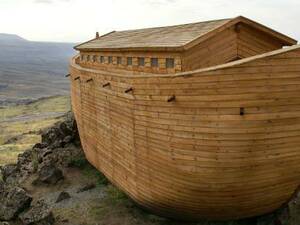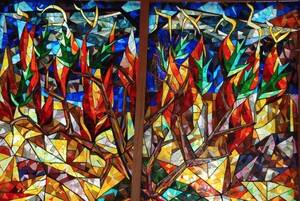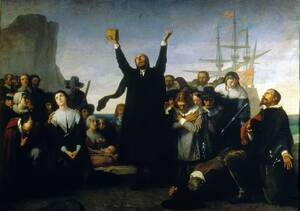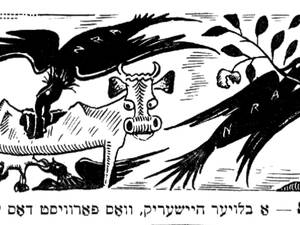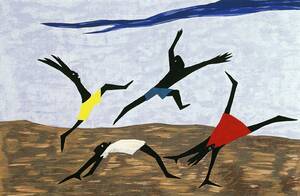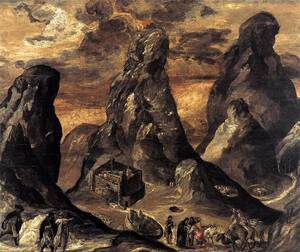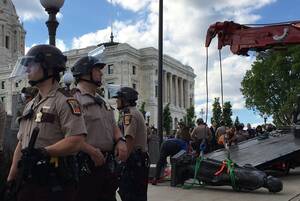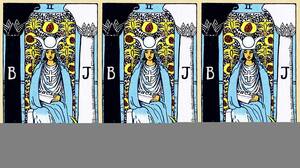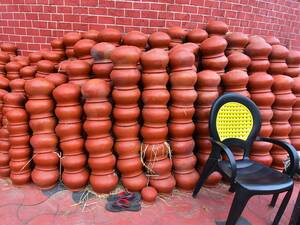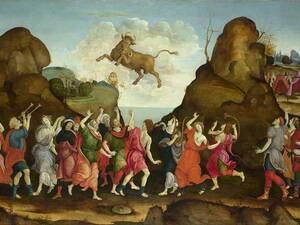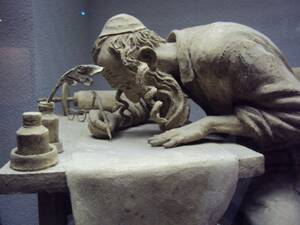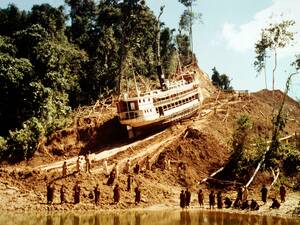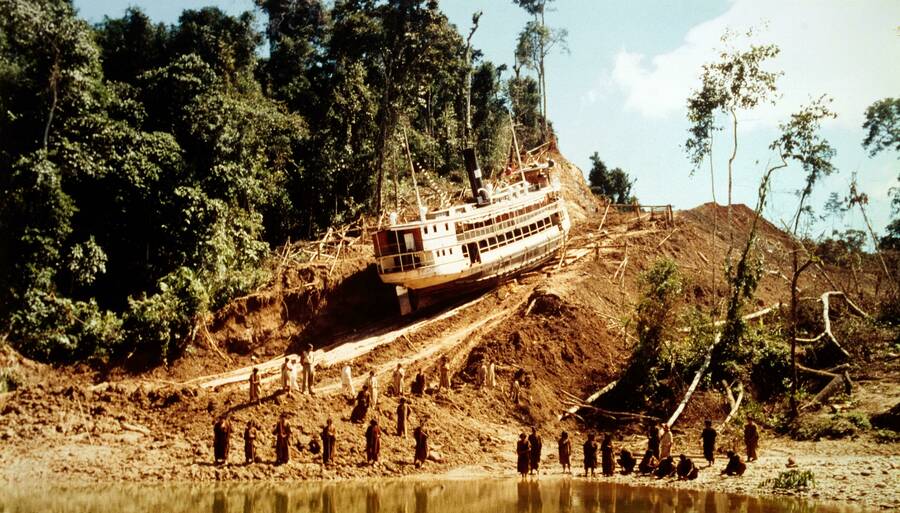
Werner Herzog, Fitzcarraldo, via Alamy
Read previous entries of Slow Burn: Quarantine Edition here.
Exodus 38:21 – 40:38
Brooklyn, NY
Dear readers,
In the famous climactic scene of Werner Herzog’s 1982 film Fitzcarraldo, an army of indigenous laborers, working with an ingenious arrangement of pulleys and gears, pulls a steamship over a mountain. The workers have been conscripted and the gears rigged by the ship’s lessor, the titular megalomaniac played by Klaus Kinski, who has become convinced that he will reap great profit if he can get it across a narrow piece of land separating one tributary of the Amazon from another. But by the time the boat is pulled through the muck, this questionable scheme ceases to matter. All we need to know is in front of us: that it is possible to get a ship over a mountain, as a majestic, crackly recording of an aria from La Bohème plays overhead.
I kept thinking of this scene when I read Pekudai, the twelfth and final parsha in the book of Exodus. Pekudai is, in many ways, one of the quietest sections of the book. In the parshas leading up to this one, the Israelites, wandering in the desert, received the tablets of the law for a second time (the first time having gone poorly), accepted God’s commandments, and procured materials for the Tabernacle according to His exacting specifications. Now, a few last items for the traveling sanctuary have been completed—Aaron’s priestly garment is constructed from the finest linens and jewels, bells are placed inside pomegranates and sewn into the garment’s hem, a crown is spun from pure gold—in a pageant of design that, Robert Alter notes, has struck some commentators as a recapitulation of God’s own creation of the world at the start of Genesis. The people give Moses the goods—from the tent’s “clasps, its boards, its crossbars” to “the golden altar and the anointing oil and the aromatic incense” that will sit inside it—and Moses blesses them. Finally, laboriously, he sets up the Tabernacle himself, until, we are told without fanfare, “Moses completed his task.”
Then, in the last paragraph of the book, something incredible happens: God returns to the people in corporeal form. Much earlier in Exodus, after the Israelites cross the sea and embark on their journey through the desert, God appears to them as a pillar of cloud during the day and as a pillar of fire by night. His subsequent desertion has been a source of considerable angst. But the Tabernacle, meticulously prepared and carried by the Israelites, successfully summons Him back in His preferred guises: As Exodus tells us in its final line, “the LORD’s cloud was over the Tabernacle by day, and fire by night was in it, before the eyes of all the house of Israel in all their journeyings.” A traveling circus, a floating opera, plodding through the desert on the people’s shoulders. Conjuring the scene from a panoramic distance, you can hear the high notes soaring above, even as, zooming in, you can see the gears turning, the backs breaking—a grand mirage, a hulking mess. It’s a real season finale ending, a Technicolor image of a wandering society that, even in the midst of terrifying dislocation, has so fully made peace with itself that its ultimate good fortune is no longer in question. In other words, it’s also an ending too good to last.
The conclusion feels overdetermined: A dizzying chain of events has led to an outcome so saturated with causes that it appears as a matter of fate. Two years ago, when a few of us embarked on this reading series during the first Passover of the pandemic—unable to imagine that either the series or the pandemic could last more than a few months—the outbreak of a global plague felt a bit like this. It was impossible and yet somehow inevitable that the world would fall apart this way; as in Exodus, the air was thick with causes for the cataclysm, as channels of global capital hysterically circulated a plague that threatened to shut them down. I remember conversations with other neurotics in which we furtively confessed feeling a superstitious sense of personal responsibility for the catastrophe, as though we were the pawns of forces that lay outside the bounds of our knowledge or control. I felt I had a good case to make: A year into a gender transition, and two weeks before the Covid lockdown began in New York, I had changed my name, an action that felt thrillingly and terrifyingly like making a tiny rip in the fabric of the universe, or sliding into a tunnel very fast. The rabbi who performed a renaming ceremony at my apartment said that Jews believed the act of a name change could summon the messiah. By April, conditions around the world had reached such an apocalyptic breaking point that everyone else was speaking in messianic terms too. “Historically, pandemics have forced humans to break with the past and imagine their world anew,” Arundhati Roy pronounced in her widely shared essay “The Pandemic is a Portal,” which Briallen reflected on in her letter on the parsha Bo. “This one is no different. It is a portal, a gateway between one world and the next.”
Perhaps a portal did open up, or a tunnel, but its exits are nowhere in sight. Overdetermination can be awe-inspiring or unbearable, like being stuck in symbolic traffic. For much of the time since I’ve changed my name I’ve found it nearly impossible to write; there was too much meaning and no clear voice in which to speak. Weeks like months, months like seasons. These letters stretched on brilliantly through the remainder of Exodus, reflecting on the uprising, a global economic crisis, and the Biden inauguration—a shaggy dog story about making sense of getting lost. Then a long gap in which I never wrote the final letter.
From its first invocation in the parsha Terumah, God’s demand that the people build him a traveling “dwelling place”—in my mind’s eye, it’s like the palatial, kitschy Mormon temple in Salt Lake City hoisted on an enormous litter—raises questions. While Moses’s endless climbs up and down Mount Sinai to receive and transmit the tablets of the law invite major theological queries of their own, their importance to the saga is clear: It is through this negotiation that the Israelites become a people. The Tabernacle, on the other hand, never quite overcomes the question of whether it might be an elaborate edifice built around a gilded red herring. Opinions differ about how much it actually belongs in the story, whether the meaning it makes is integral or superfluous to the central narrative of Exodus: the flight from bondage to freedom, the receipt of the law. The Medieval sage Maimonides argued that the Jews were commanded to build the Tabernacle not because God saw it as having intrinsic value but because He felt the Israelites required a substitute for the idol-based worship they had become accustomed to in Egypt, which erupted in the form of the Golden Calf. The scholar Nahmanides disagreed, claiming that the rituals conducted at the Tabernacle were necessary to repair a breach introduced into the cosmos by the fall from Eden.
I see a related argument at the center of the letters we’ve written each other in this series. In her entry on Terumah, Carina asked whether the Tabernacle served as God’s way of redirecting the “anarchic self-determination” of “the Riot of the Golden Calf.” If the people had claimed “their own kind of sacred space” in rallying around the idol, Carina wrote, “I can’t help reading the Tabernacle—with its bicameral design, its many borders and prohibitions, its lavish display of taxpayer dollars—as God’s effort to placate and institutionalize the riot’s energy.” In this reading, the sacred compound is essentially a zone of containment, however far it stretches across the wilderness. Isaac, on the other hand, argued in his letter on Ki Tissa that the riot made up only one stage in the larger dialectic of the people’s growing self-realization, which then precipitated Moses’s return up the mountain and the second giving of the law: not handed down from above this time, but transcribed by the prophet as a delegate of the people with his own hand. If we can take this work of revision seriously as a democratic act, a real negotiation between a people and a God who communicates with them largely by intervening in their environment like a mad artist throwing paint at his canvas, then the Tabernacle can be understood as a space of mediation, a kind of cosmic demilitarized zone.
Reading Pekudai, I’m struck by how tenacious both of these readings remain for me; instead of one giving way to the other, they appear superimposed atop each other. On the one hand, the dignified procession of a hard-won alliance; on the other, God smugly schlumphing toward Bethlehem with His captive audience in tow. The sublime bathos of a ship going over a mountain.
Back in our introduction to this series, I confessed that the astonishing eruptions of the pandemic had forced me to confront the embarrassing fact that I believed in both God and dialectical materialism, and furthermore thought that, “in their ability to reorder the world through the agency of previously unseen forces,” they were probably the same thing. Having stumbled into this state of awe, I found there was nothing to do but draw closer to its source. “I feel a rickety barrier within myself breaking down,” I wrote with the melodramatic flair of someone who secretly believes their name change caused a global pandemic, “a sense of giving in to my understanding of our situation, a sense of joining up.” In some sense it turned out to be true for me; I entered the portal, I joined up. In my case the slide into collectivity happened through tenant organizing; my sense of a collective came to include neighbors with whom I’d previously had only an abstract relationship created by a faceless landlord, and now had bonds we’d made ourselves. Once there was a “we,” the future became less an object of superstition and more plausible and specific; it became ours. The growing reality of things could be described as a process of demystification, which it was, but it also felt mystical: First there was nothing, then there was talking, then there was something.
Two years later, the connection between reordering the world and joining up—the way in which these processes sustain each other—is far more concrete to me than it was before. At various points over the past tumultuous decade I had been mesmerized by glimpses of the social order rearranged; sometimes I had taken part, but I had never made anyone any promises. When that changed, so did my calculus of what skills to practice, what patterns to count on. To systematically court new challenges and sometimes new dangers in the name of building collective power is to slowly divest from a system of belief about what security looks like; it is, in short, to place one’s faith in one’s own agency in concert with others. In his book The Hidden God, the 20th-century French Jewish philosopher Lucien Goldmann similarly argued that communists, like some Christians before them, should relate to their credo as a kind of bet. Goldmann thought that the belief structure that emerged from class struggle had an analogue in the famous Catholic theological argument known as Pascal’s wager: Faced with the impossibility of knowing whether God exists, the 17th-century mathematician Blaise Pascal reasoned, men should choose belief because the stakes of wrongly forswearing Him—eternal damnation—were so much higher than the stakes of wrongly worshiping. Goldmann saw what he called “Marxist faith” as a similar wager, both rational and utterly without guarantees. In his words,
Marxist faith is faith in the future which men make for themselves in and through history. Or, more accurately, in the future that we must make for ourselves by what we do, so that this faith becomes a “wager” which we make that our actions will, in fact, be successful. The transcendental element present in this faith is not supernatural and does not take us outside or beyond history; it merely takes us beyond the individual.
In the book of Exodus, too, the choice to become historical subjects—which means, for the Israelites, the choice to become the protagonists of an erratic but ultimately loyal God—is inseparable from the process of becoming a group capable of collective decision-making. Once they have crossed into the desert, their survival depends on their ability to function as a social body, to hold together through shattering strife and conflict. It is self-evident that people in pursuit of freedom cannot trust their enemies; the infinitely more nuanced question is whether they can trust each other. When faith in the group breaks down—as it does in the parshas debated by Carina and Isaac, Maimonides and Nachmanides—faith in the future does, too. In Exodus, the people respond to this crisis by binding themselves together through a covenant, or what in secular terms might appear as the bylaws of a rather strict revolutionary organization or party. (In Freud’s skeptical alternate reading, Len noted in his letter, the people first spectacularly fail at the task of cohesion, murdering their leader Moses, then retroactively appease their shame through the prohibitions of the covenant.)
Quoting the Marxist critic György Lukács, Goldmann observed that men in their “weakness and cowardice . . . love everything which is hazy and uncertain in life, and adore the soothing monotony of the Grand Perhaps,” eschewing definitive action—until a miracle occurs, “forc[ing] itself into a man’s life and mak[ing] it into a clear and unambiguous sum of things achieved.” Outside works of myth like the book of Exodus, it is rare for God to come down from the heavens and dwell among the people. But miracles do happen; empires do fall. Ships do go over mountains. It just takes a lot of people to carry them.
love and solidarity,
ari
Ari M. Brostoff is the senior editor of Jewish Currents.
